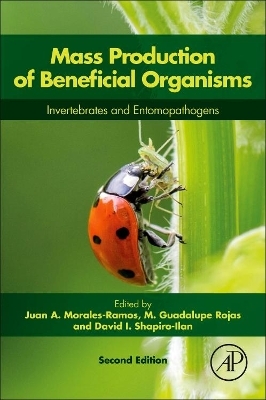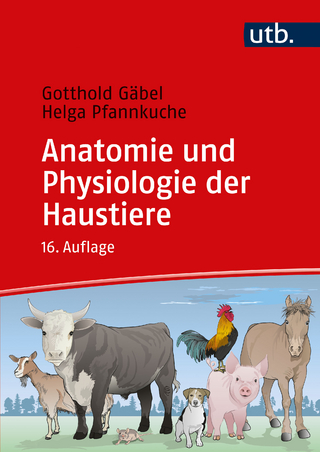
Mass Production of Beneficial Organisms
Academic Press Inc (Verlag)
978-0-12-822106-8 (ISBN)
Beneficial organisms include not only insect predators and parasitoids, but also mite predators, nematodes, fungi, bacteria and viruses. In the past two decades, tremendous advances have been achieved in developing technology for producing these organisms. Despite that and the globally growing research and interest in biological control and biotechnology applications, commercialization of these technologies is still in progress. This is an essential reference and teaching tool for researchers in developed and developing countries working to produce “natural enemies in biological control and integrated pest management programs.
Dr. Morales’ main expertise is in mass production of arthropods, insect nutritional ecology and thedevelopment of rearing methods and mechanization of rearing processes for beneficial arthropods.Between 1992 and 1998, he developed mass propagation technology for the boll weevil parasitoidCatolaccus grandis. This research earned him the USDA-ARS scientist of the year award in 2002.During 1998 and 2004 he developed termite and ant baiting systems. This research earned him theUSDA-ARS technology transfer award and the Federal Laboratory Consortium regional excellence intechnology transfer award in 2004. Since 2004, he has developed novel rearing methods forpredatory mites and other beneficial arthropods. This included new technology for separation ofmealworm sizes for infection with entomopathogenic nematodes, novel methods for mass producingTenebrio molitor, mechanized methods to pack T. molitor cadavers infected with nematodes, andmechanized methods for infecting T. molitor larvae with entomopathogenic nematodes. The work onthe in-vivo production of entomopathogenic nematodes using T. molitor earn him the NationalFederal laboratory Consortium award of excellence in technology transfer in 2013. Dr. Morales-Ramos has produced a total of 104 publications and 12 patents; his is currently the project leader ofthe project titled “Mass Production of Biological Control Agents. Dr. Morales-Ramos recently editedthe book titled “Mass production of Beneficial Organisms published in January 2014 by Elsevier. Dr. Rojas’ main expertise is in insect nutrition, nutritional ecology and the development of artificialdiets for biological control agents and bait matrixes to control termites and ants. Between 1993 to1998 she developed an artificial diet for the boll weevil parasitoid Catolaccus grandis. Between 1998and 2004, she developed bait matrices for control of the Formosan subterranean termite andhousehold ants, both of which were successfully commercialized by Ensystex and FMC, and still aresold world-wide. This work earned her the USDA-ARS technology transfer award and the FederalLaboratory Consortium regional excellence in technology transfer award in 2004. Since 2004, she hasdeveloped artificial diets for predatory mites and other insect predators and improved susceptibilityof Tenebrio molitor to entomopathogenic nematodes. The work on the in-vivo production ofentomopathogenic nematodes using T. molitor earned her the National Federal laboratory Consortium award of excellence in technology transfer in 2013. Dr. Rojas has produced a total of 99 publications and holds 12 patents, her current responsibilities include principal scientist on 3 different research agreements with 3 different companies including Syngenta Bioline, Kopert, and Monsanto. . Dr. Rojas recently co-edited the book titled “Mass production of Beneficial Organisms published in January 2014 by Elsevier.
1. Introduction
2. Production of Coleopteran Predators
3. Production of Heteropteran Predators
4. Production of Dipteran Parasitoids
5. Mass Rearing Bemisia Parasidoids for Support of Classical and Augmentative Biological Control Programs
6. Mass Rearing of the Stem-Galling Wasp Tetramesa romana, A Biological Control Agent of the Invasive Weed Arundo donax
7. Artificial Diet Development for Entomophagous Arthropods
8. Life Tables as Tools of Evaluation and Quality Control for Arthropod Mass Production
9. Concepts and Methods of Quality Assurance for Mass-Reared Parasitoids and Predators
10. Production of Entomopathogenic Nematodes
11. Mass Production of Entomopathogenic Fungi: State of the Art
12. Commercial Production of Entomopathogenic Bacteria
13. Production of Entomopathogenic Viruses
14. Formulations of Entomopathogens as bioinsecticides
15. Mass Production of Entomopathogens in Less Industrialized Countries
16. Insect Protein as a Partial Replacement for Fishmeal in the Diets of Juvenile Fish and Crustaceans
17. Insects as Food for Insectivores
18. Insects for Human Consumption
19. Production of Solitary Bees for Pollination in the United States
20. Current and Potential Benefits of Mass Earthworm Culture
| Erscheinungsdatum | 15.09.2022 |
|---|---|
| Zusatzinfo | 100 illustrations; Illustrations |
| Verlagsort | San Diego |
| Sprache | englisch |
| Maße | 216 x 276 mm |
| Gewicht | 1930 g |
| Themenwelt | Naturwissenschaften ► Biologie ► Zoologie |
| Weitere Fachgebiete ► Land- / Forstwirtschaft / Fischerei | |
| ISBN-10 | 0-12-822106-2 / 0128221062 |
| ISBN-13 | 978-0-12-822106-8 / 9780128221068 |
| Zustand | Neuware |
| Informationen gemäß Produktsicherheitsverordnung (GPSR) | |
| Haben Sie eine Frage zum Produkt? |
aus dem Bereich


